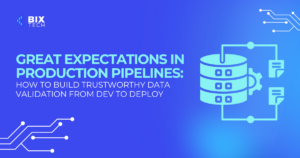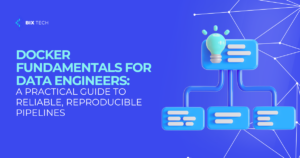What Is a Data Engineer? Unlocking the Backbone of Modern Business Intelligence

Sales Development Representative and excited about connecting people
In today's data-driven landscape, businesses often hear about the importance of data science, analytics, and artificial intelligence. But behind the scenes, there's another critical role that makes all these innovations possible: the data engineer. If you've ever wondered who builds the pipelines that move, clean, and organize the vast seas of information powering your business insights, you're about to meet the unsung hero— the data engineer.
In this article, we’ll demystify the role of the data engineer, explore their core responsibilities, and show you why they’re indispensable for companies looking to harness the full value of their data.
Table of Contents
- What Does a Data Engineer Do?
- Key Skills Every Data Engineer Needs
- The Data Engineer’s Toolkit: Technologies & Tools
- Why Data Engineering Matters for Your Business
- Real-World Applications & Examples
- How Data Engineering Powers Advanced Analytics
- Getting Started: Building Your Data Engineering Team
- Conclusion
What Does a Data Engineer Do?
A data engineer is responsible for designing, building, and maintaining the systems and architecture that allow organizations to collect, store, and process data efficiently. Think of them as the architects and builders of the digital highways that connect raw data to the analytics and business intelligence tools decision-makers rely on.
Core Responsibilities
- Data Pipeline Construction: Building robust systems to collect, transform, and move data between sources and destinations.
- Data Integration: Consolidating information from different databases, APIs, or file systems.
- Data Quality Management: Ensuring data is accurate, consistent, and accessible.
- Performance Optimization: Making sure data systems scale efficiently as volumes grow.
Data engineers collaborate closely with data scientists, analysts, and business stakeholders to ensure the right data is available, clean, and ready for actionable insights.
Key Skills Every Data Engineer Needs
Data engineering is a multidisciplinary field that demands both technical know-how and problem-solving capabilities. Here’s what sets a great data engineer apart:
Technical Skills
- Programming: Proficiency in languages like Python, Java, or Scala.
- Database Management: Deep understanding of SQL, NoSQL, and cloud database technologies.
- Data Modeling: Designing structures that reflect business needs and optimize query performance.
- ETL (Extract, Transform, Load): Building pipelines that move and prepare data for analytics.
- Big Data Frameworks: Familiarity with Hadoop, Spark, and distributed processing.
Soft Skills
- Communication: Translating technical concepts for non-technical teams.
- Attention to Detail: Spotting inconsistencies and ensuring data integrity.
- Project Management: Handling complex projects and meeting deadlines.
- Problem-Solving: Troubleshooting data flow and quality issues.
The Data Engineer’s Toolkit: Technologies & Tools
Modern data engineers use a suite of technologies to solve complex data challenges. Here are some of the most popular tools and platforms:
- Databases: MySQL, PostgreSQL, MongoDB, Cassandra
- Cloud Platforms: AWS (Redshift, S3), Azure, Google Cloud Platform (BigQuery)
- Big Data Processing: Apache Spark, Hadoop, Flink
- Data Orchestration: Airflow, Luigi
- ETL Tools: Talend, Informatica, AWS Glue
- Data Warehousing: Snowflake, Amazon Redshift, Google BigQuery
The right toolset depends on the organization’s data volume, complexity, and business needs. For example, real-time analytics might require a different architecture than batch processing for historical data.
Why Data Engineering Matters for Your Business
Data engineering isn’t just a technical discipline—it’s a business enabler. Here’s why:
- Scalability: As your business grows, so does your data. Data engineers build systems that scale seamlessly, ensuring you never miss critical insights.
- Data Quality: Clean, reliable data is the foundation of accurate business intelligence. Data engineers implement frameworks to catch errors before they reach analytics tools.
- Faster Insights: Efficient pipelines mean stakeholders can access up-to-date data quickly, driving faster decision-making and innovation.
- Cost Efficiency: Well-designed data architectures save cloud and storage costs by minimizing redundancy and optimizing performance.
For a deeper look at how data engineering underpins modern business, check out The Role of Data Engineering in Modern Business.
Real-World Applications & Examples
Let’s bring the role of the data engineer to life with some practical examples:
E-commerce
A global retailer wants to personalize product recommendations. Data engineers set up pipelines that ingest customer behavior data, clean it, and feed it into machine learning models for real-time recommendations.
Healthcare
Hospitals need to aggregate patient data from multiple systems for predictive health analytics. Data engineers design secure, HIPAA-compliant data lakes that centralize information for medical researchers.
Financial Services
Banks must detect fraudulent transactions in real time. Data engineers build streaming data architectures that monitor transactions as they happen, flagging anomalies for further investigation.
For more insights into how advanced analytics and predictive models are transforming industries, explore our guide on Crafting Tomorrow’s Strategies: Predictive Analytics.
How Data Engineering Powers Advanced Analytics
Without data engineers, even the best data scientists would struggle. Here’s how data engineering fits into the analytics puzzle:
- Data Preparation: Raw data is often messy—full of duplicates, missing values, or irrelevant information. Data engineers automate the cleaning and transformation process.
- Data Availability: By centralizing data from multiple sources, data engineers ensure analysts and AI models have what they need to work effectively.
- Real-Time Analytics: Building streaming data pipelines enables businesses to react instantly to market changes or customer behavior.
Getting Started: Building Your Data Engineering Team
Ready to unlock the power of your data? Here’s how to get started:
- Assess Your Needs: Do you need analytics in real-time or are batch reports sufficient?
- Define Data Sources: Identify all systems generating valuable business data.
- Choose the Right Technology: Select cloud, database, and ETL tools that fit your scale and goals.
- Hire or Upskill Talent: Look for candidates with programming, data modeling, and big data experience.
- Establish Best Practices: Implement data quality checks, documentation, and robust security protocols.
If you’re considering scaling your analytics or launching new data initiatives, partnering with experienced data engineers or consulting firms can accelerate your journey.
Conclusion
Data engineers are the backbone of modern data-driven organizations. They transform chaotic streams of raw information into structured, actionable insights that empower smarter business decisions. As data continues to grow in both size and strategic importance, the value of skilled data engineers will only increase.
Whether you’re a startup or an enterprise, investing in data engineering is the key to unlocking the true potential of your data. Ready to take your business intelligence to the next level? Now’s the time to build—or strengthen—your data engineering foundation.
Curious about how data engineering can transform your organization? Dive deeper with Data Engineering in Modern Business and discover why it’s a game-changer for companies worldwide.










